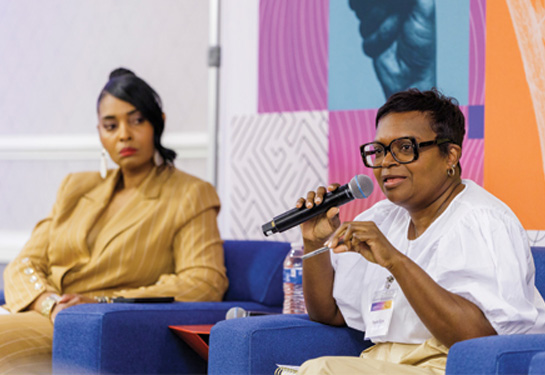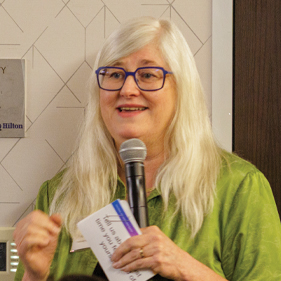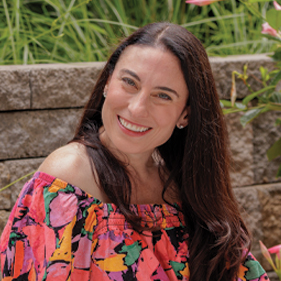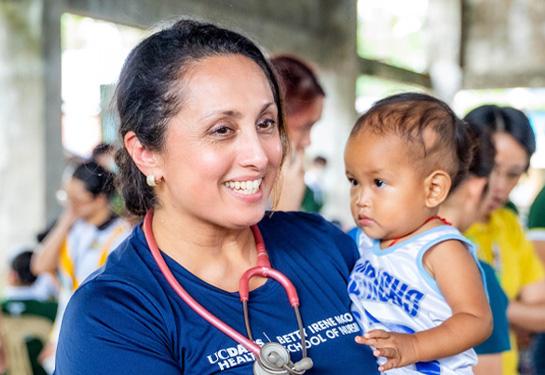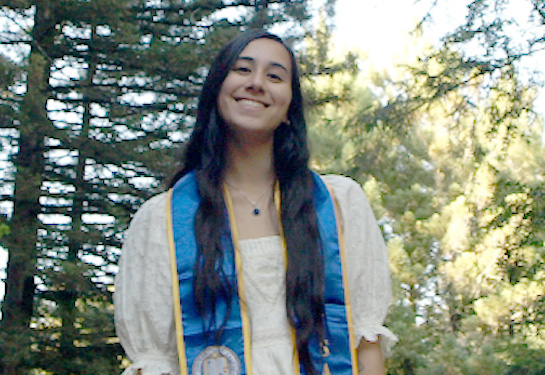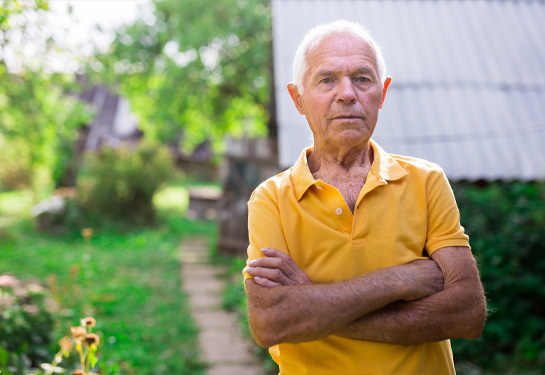Betty Irene Moore Fellows gather in the nation’s capital for sixth annual convocation
Cohorts explore the intersection of policy, politics and nursing innovation
For the first time since its launch, the national program office for the Betty Irene Moore Fellowship for Nurse Leaders and Innovators held its annual Convocation in Washington, D.C., from June 25 to 30. The nation’s capital served as a fitting backdrop for the program’s sixth event, which focused on the intersection of policy, politics and nursing innovation.
Nearly 60 fellows from five cohorts gathered from across the country to participate in structured learning activities centered on leadership, strategic communication, community building and driving innovation during times of unprecedented uncertainty. They were joined by more than 20 Fellowship National Advisory Council members, nurse leaders and program faculty.
Attendance grew to 150 people for two days of the event. That’s when nurses from the Hillman Scholars in Nursing Innovation, grantees of The Rita and Alex Hillman Foundation and Hillman leadership and staff joined for shared activities. They formed connections, worked to understand the current policy landscape and formulated creative ideas for advancing nursing work in a complex climate.
This shared experience fosters meaningful connections, inspires bold thinking and strengthens our collective ability to advance nursing leadership and innovation in challenging times.—Heather M. Young, Fellowship National Director
“Bringing together the Betty Irene Moore Fellows with Rita and Alex Hillman Foundation grantees and Scholars creates synergy and a powerful space for collaboration among nurse scientists with aligned interests. This shared experience fosters meaningful connections, inspires bold thinking and strengthens our collective ability to advance nursing leadership and innovation in challenging times,” said Heather M. Young, national program director for the fellowship.
Collaborating to reimagine the future
After an evening of connection and idea-sharing on June 27, attendees spent the next day engaging with panelists on topics such as health policy and community partnerships. They also identified actionable steps and new opportunities to reimagine the future of nursing, sharing their ideas with the IDEO design firm to help shape a path forward.
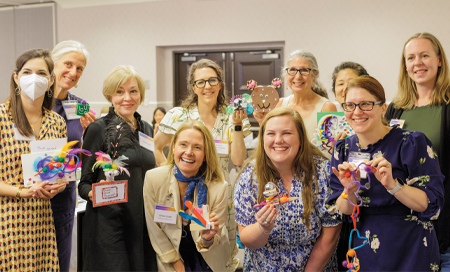
The day began with a playful, creative activity led by Make Believe Works, where participants designed art pieces inspired by each other’s personal mottos — known as “emblemottos.” This exercise helped attendees connect beyond their professional roles, fostering deeper understanding, shared values and a stronger sense of community.
A panel session followed, moderated by J. Margo Brooks Carthon, from the University of Pennsylvania. It featured Fellowship National Advisory Council members Susan Reinhard and Mary Wakefield, along with emeritus council member Sarah Szanton. Each shared practical insights and strategic guidance to help nurse leaders persevere and thrive amid political uncertainty. Reinhard said the audience’s engagement reinforced the vital role nurses have in shaping policy.
“I was inspired by the fellows’ active interest in public policy,” Reinhard said. “I see tremendous growth and potential to advance my firm belief that policy is a nursing intervention at the societal level.”
Attendees also participated in a panel on creative action, moderated by Kristen Choi, a 2022 cohort fellow from the UCLA School of Nursing. It featured nurse leaders including her cohort colleague Fayron Epps, from the University of Texas Health Science Center at San Antonio School of Nursing, and Schenita Randolph, a 2020 cohort fellow from the Duke University School of Nursing. Other panelists were Ebony Marcelle, from Community of Hope, and Christina X. Marea, from Georgetown University.
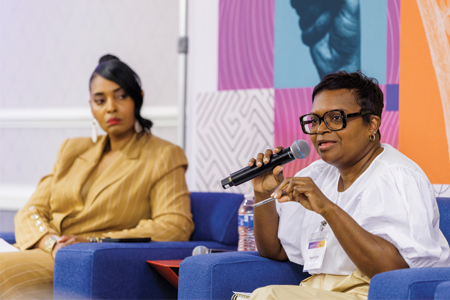
The panel explored innovative strategies for building strong community partnerships and sustainable coalitions, highlighting creative approaches to securing funding and driving meaningful change.
Epps encouraged listeners not to be discouraged by decreases in federal funding, but to focus on what is truly essential to advance their research.
“Leverage relationships for in-kind support and co-design research interventions with your community, as they may be willing to help fund your research,” Epps said. “Think outside the box that we’ve been told we have to be in and crush it!”
Advancing impact through strategic communication and service
The day after the joint symposium, fellows and fellowship program community members gathered for a keynote session. It began with the 2023 cohort taking center stage to present their projects to a panel of six journalists. After delivering a two-minute news story pitch, each fellow received constructive feedback on how to refine their message and earn media coverage.
Fellows from the 2024 cohort also had the opportunity to apply their strategic communications training by delivering one-minute presentations that showcased the vision behind their research projects. Schola Matovu, 2024 cohort fellow from the University of Utah College of Nursing, said the experience emphasized the vital role of clear and compelling messaging in advancing nursing science.
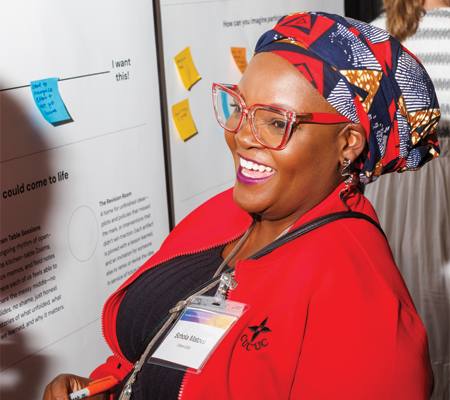
“Our strategic communications sessions affirmed the power of nursing voices to shape public narratives and influence change,” Matovu said. “Surrounded by visionary nurse leaders, scholars and changemakers, I deepened my understanding at this year’s convocation of how communication, policy and human-centered innovation can amplify impact.”
The keynote session concluded with a panel discussion on how nurses can exert influence and impact policy change by serving on the boards of various organizations. Moderated by Reinhard, the panel featured Fellowship National Advisory Council members Martha Dawson and Antonia Villarruel, as well as Melissa O’Connor, a 2020 cohort fellow from the Hunter-Bellevue School of Nursing at Hunter College.
“I’ve served on more than 30 different boards. It’s all about service, reaching out to others and having an impact,” Dawson said. “It’s highly worthwhile because you get to help identify the future of that organization.”

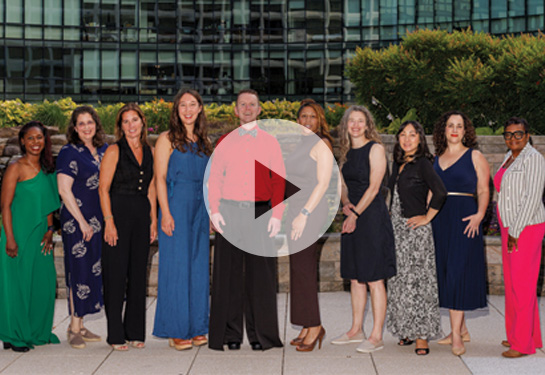
Celebrating the 2022 cohort and being together
Fellows reflected on and celebrated their convocation experience at a special dinner reception honoring the accomplishments of the 2022 cohort across the three-year-fellowship program. Cohort members staged a simulated talk show, with Epps interviewing her fellow cohort members about their projects and the impact of their work.
Alvin Jeffery, a 2022 cohort fellow from Vanderbilt University Medical Center, said the convocation was monumental beyond just completing the program.
Convocation was extremely valuable this year, particularly given all the political injustices happening in the nation along with attacks on science and health care.—Alvin Jeffery, Cohort 2022 Fellow
“Convocation was extremely valuable this year, particularly given all the political injustices happening in the nation along with attacks on science and health care. While I left convocation physically and mentally exhausted, my heart is filled with renewed hope that our group of brilliant, dedicated, kind and compassionate nurse leaders could help move ‘the arc of the moral universe...toward justice’ (to use Dr. Martin Luther King Jr.’s words) a bit faster,” Jeffery said.
Danielle Altares Sarik, a 2024 cohort fellow from Nicklaus Children’s Hospital, agreed.
Convocation gave me the gift of time to stop, reflect, recenter and recommit to the work ahead.—Danielle Altares Sarik, Cohort 2024 Fellow
“Convocation gave me the gift of time to stop, reflect, recenter and recommit to the work ahead. Being in community with fellows and scholars who continue to work tirelessly to improve health for all people is both inspiring and affirming,” she said.
About the Fellowship
The Betty Irene Moore Fellowship for Nurse Leaders and Innovators launched in 2020 with a $37.5 million grant from the Gordon and Betty Moore Foundation. The foundation gave an additional $7.4 million in 2023 to increase the number of future fellows and build on the fellowship’s momentum. Early- to mid-career nursing scholars and innovators are selected to participate in the three-year program and take part in an innovative project or study. Fellows receive $450,000 in funding for their project plus $50,000 for their home institution. Fellows gather annually for a week-long convocation and participate in an online learning community and mentorship throughout the three-year period. The foundation has funded five cohorts of fellows, with the fifth cohort concluding its three-year program on June 30, 2027.

